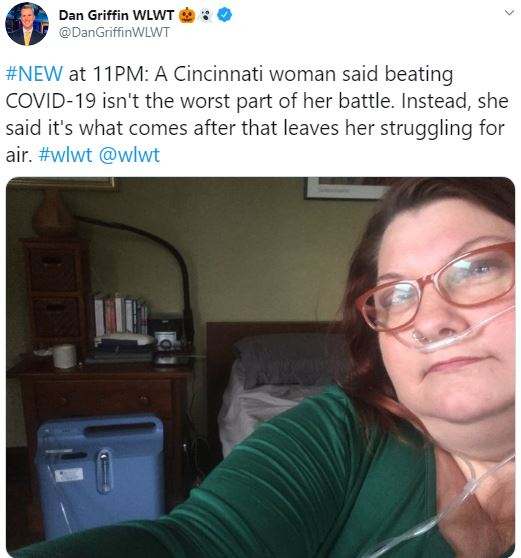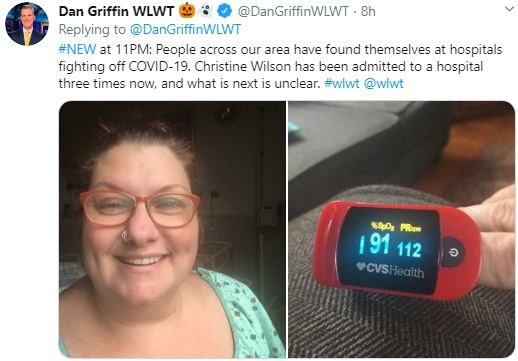A 47-year-old woman from Cincinnati tested positive for the novel Coronavirus infection in mid-July. But her battle against the COVID-19 has not ended yet as she is still facing several health problems.
The Coronavirus victim Christine Wilson has been admitted to the hospital three times as of now and she is not sure when she will be hospitalized again. She said even after many months since she had come out of the Coronavirus infection, "I'm still fighting the battle and I'm aware after this third stay that it's going to be a long battle."

The Never-Ending COVID-19 Journey
Like the US President Donald Trump, who recently tested positive for COVID-19, Wilson said she is also on a Coronavirus journey but there is no roadmap. While talking about her current health issues, the Cincinnati woman said, "I'm short of breath all of the time, I'm coughing, fatigue, kind of achiness, and there are bouts of bad headaches as well."
After the woman tested positive and was taken to a hospital in mid-July, she was given COVID-19 convalescent plasma to help her recover. Since then the woman has been taken to the hospital for pneumonia and inflammation in August and September.
Wilson was discharged from the hospital recently after spending six days in medical care and now she is on steroids for the fourth round. Apart from the steroids, there are other things which she is now used to due to SARS-CoV-2. Along with steroids "oxygen at home, and I'm actually starting a program for lung rehab," she said.
According to the COVID-19 survivor, the struggle is very long, and even after tested negative for the disease, she can't do what she did before. "I had five days of COVID before I entered the hospital that was just like, at home being sick. So, I don't think we have a clue what is in for the president yet. I really don't," she added.

Damage Recovery
The coronavirus has infected over 35 million people and killed more than 1,037,000 individuals globally. Even though millions of people have already recovered, some patients report long term effects on body organs. Researchers at University Clinic in Innsbruck in Austria have found long-term lung and heart damage in COVID-19 patients who recovered.
In their study, presented to the European Respiratory Society International Congress, the researchers evaluated if the long-term heart and lung damage patients experience after being infected with the virus will improve.
The study has more than 150 patients participating to determine what happens after recovering from COVID-19. They said more than half of the discharged patients reported breathlessness and coughing. On a 12-week visit, they said the symptoms have improved, especially reduction of breathlessness. About 39 percent of the patients reported that they are still having shortness of breath, while 15 percent were still coughing. Then the researchers tested lung functions:
- FEV1: measures the amount of air which can exhale forcibly within one second
- DLCO: how well oxygen passes from the lungs into the bloodstream
- FCV: measures the total volume of air expelled forcibly
Dr. Sabina Sahanic, who is a clinical Ph.D. student at the University Clinic in Innsbruck said that the bad news is that Coronavirus patients show lung impairment weeks after their discharge. But the good news is that "the impairment tends to ameliorate over time, which suggests the lungs have a mechanism for repairing themselves," she added.
She also explained that as per the team's findings, the importance of implementing structured follow-up care for severe COVID-19 patients is highly recommended. Importantly, a CT scan has unveiled lung damage in this patient group that was not found in primary lung function tests. "Knowing how patients have been affected long-term by the coronavirus might enable symptoms and lung damage to be treated much earlier and might have a significant impact on further medical recommendations and advice," she said.









